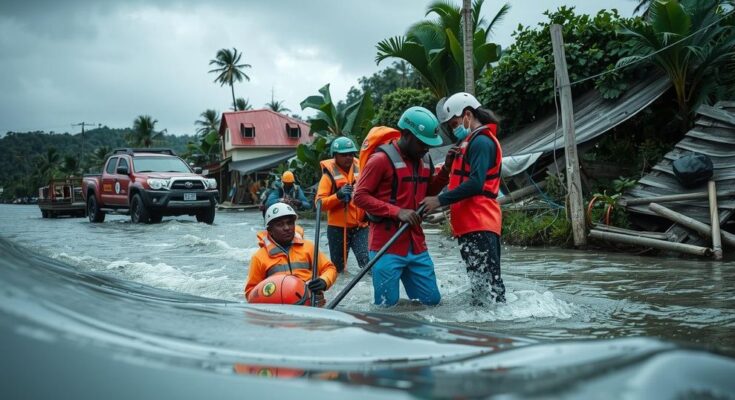Cyclone Chido devastated the island of Mayotte, with winds over 124 mph leading to at least 20 confirmed deaths and fears of thousands more. Authorities raise alarms about severe shortages of food and water, urging urgent aid. French officials are mobilizing resources and support as the situation unfolds, highlighting ongoing vulnerabilities in this impoverished territory of France.
Rescue teams continue to search for survivors on the island of Mayotte following the impact of Cyclone Chido, which brought devastating winds exceeding 124 mph. The cyclone, considered the worst to strike the region in nearly a century, has raised acute concerns over food and clean water shortages as the local senator, Salama Ramia, warns, “there’s no water” and acknowledges that “hunger is starting to rise.” With reports indicating that at least 20 individuals have died, officials fear the death toll could potentially reach into the thousands as the situation unfolds. Medical and emergency supplies, including 20 tons of provisions from the French Red Cross, are being dispatched to assist the beleaguered population, whose needs are becoming more dire by the hour.
Authorities have faced significant challenges in assessing the total number of casualties due to extensive destruction across the island, particularly affecting communications and electricity. The mayhem has rendered many areas inaccessible, significantly hampering relief efforts. “I think there are some several hundred dead, maybe we’ll get close to a thousand, even thousands,” said Mayotte Prefect Francois-Xavier Bieuville, reflecting the overwhelming devastation. Aid response has also encountered logistical issues as Mayotte’s main hospital and airport suffered substantial damage.
As the cyclone progresses through the region, impacting nearby nations, the urgency for aid becomes more pronounced, particularly for the vulnerable segments of the population, including children. French President Emmanuel Macron has declared a national day of mourning and is expected to visit Mayotte to assess the situation and provide support. This disaster not only highlights the immediate impacts of Cyclone Chido but also underscores the ongoing vulnerabilities faced by territories such as Mayotte, France’s poorest region located in the Indian Ocean.
Cyclone Chido made landfall over the weekend in Mayotte, exacerbating the existing humanitarian challenges faced by the population of this French overseas territory. Severely impacted by extreme weather events, Mayotte has a history of vulnerability due to its geographical location in the Indian Ocean, making it susceptible to tropical cyclones. The region currently contends with inadequate infrastructure and limited resources, rendering recovery from such disasters a complex and critical priority. The cyclone’s winds not only damaged homes but also disrupted essential services such as hospitals and communication, intensifying the plight of its residents. The ongoing relief efforts from local and global organizations signify a pivotal moment in addressing the immediate needs and long-term recovery strategies for Mayotte.
In summary, Cyclone Chido has left a profound mark on the already vulnerable region of Mayotte, leading to significant loss of life and extensive material damage. With rescue operations underway and urgent pleas for humanitarian aid, the situation remains critical, particularly concerning access to food and clean water. The French government, alongside humanitarian organizations, is mobilizing resources to address the disaster’s ramifications, but the path to recovery will undoubtedly require sustained efforts and support.
Original Source: news.sky.com




